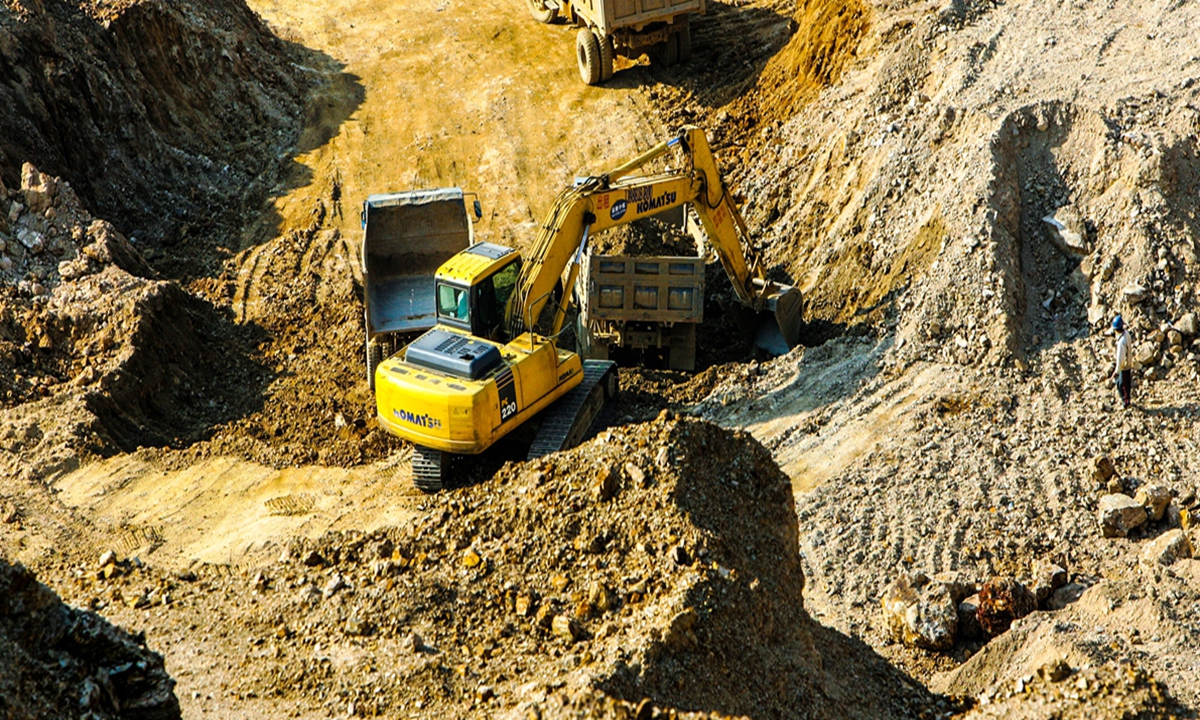
Rare earth Photo: VCG
China's rare-earth giants are mulling a restructuring, and a super group in the medium-heavy rare-earth sector is expected to be born soon. Analysts said the move will help enhance market concentration to better guide industry development and contribute to improving competitive edge.
China Minerals Rare Earth Co Ltd said on Thursday that its parent China Minerals Corp, Aluminum Corp of China and the government of Ganzhou, East China's Jiangxi Province, are planning a strategic restructuring of rare earth assets.
"The relevant plan has not yet been finalized, and needs approval from relevant authorities," said a filing to the Shenzhen Stock Exchange.
The two groups are among the "Big Six" state-owned enterprises that dominate the industry in China, while Ganzhou is a major rare-earth resource hub where another Big Six company South China Rare Earth Group Co is based.
The three parties own mining output quota for medium and heavy rare earth metals of 9,870 tons in total, accounting for 85.9 percent of the first batch of quotas set for 2021. This means that their restructuring will establish a super group focused on medium-heavy rare-earth products, according to experts.
"The restructuring reflects growing government attention on the healthy development of the rare-earth industry, which will help resolve persistent environmental problems while enhancing market concentration," Chen Zhanheng, deputy head of the Association of China Rare Earth Industry, told the Global Times on Friday.
Rare earths - which are dubbed "industrial gold" - are a group of 17 chemical elements used in everything from high-tech consumer electronics to military equipment.
China leads the world's rare-earth sector in terms of production and refining technologies. According to the US Geological Survey, China accounted for 58 percent of rare-earth production worldwide in 2020, down from around 90 percent some four years ago as the US and Australia gradually boosted production.
However, China's rare-earth industry faces other challenges, for example, environmental protection problems affecting the lives of local residents and a waste of the valuable resource due to enterprises' price-based competition.
Xiao Yaqing, minister of the Ministry of Industry and Information Technology (MIIT), said in March that "China's rare earths aren't being sold at a 'rare' price but at an 'earth' price."
To stabilize the rare-earth market and facilitate the protection of industrial security and ecological environment, the MIIT released draft rules to step up regulation over the industry and enhance the closed-loop management of the industrial chain.
Since then, Western countries have had concerns over China's possible move to restrict exports of the strategic material, and some politicians in the US have long been wishfully pushing the so-called rare-earth independency.
Chen said that it is not possible for the US and other Western economies to shake off their reliance on China's supply chain in a short period. "China will still be an important global supplier of the resources over the next 10 years," he said.
Facing the US' trade war and technology crackdown, China has never chosen to weaponize rare earths, Qian Feng, director of the research department at the National Strategy Institute at Tsinghua University, told the Global Times.
China has always encouraged normal and win-win trade cooperation on the basis of protecting resources and meeting its own development needs, Qian said.
"Economic globalization is a major trend. We need to work together to meet the needs for resources, energy and products in the process of economic and market development. I think that this is mainly about promoting healthier and more sustainable development, in view of our current problems," Xiao reiterated.




